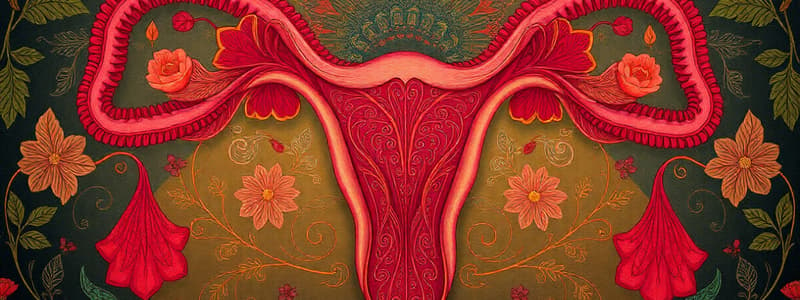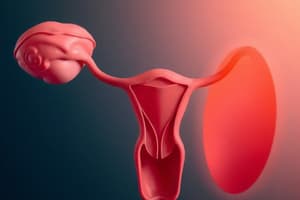Podcast
Questions and Answers
Which hormone is primarily responsible for initiating the development of male characteristics?
Which hormone is primarily responsible for initiating the development of male characteristics?
- Estrogen
- FSH
- Testosterone
- SRY (correct)
What is the primary purpose of the placenta during pregnancy?
What is the primary purpose of the placenta during pregnancy?
- To remove the fetus after delivery
- To provide nutrients and oxygen to the fetus (correct)
- To regulate menstrual cycles
- To produce sex hormones
Which of the following factors can contribute to infertility?
Which of the following factors can contribute to infertility?
- Adequate sleep
- Regular exercise
- Hormonal imbalances (correct)
- Proper nutrition
During childbirth, what occurs during the stage of labor?
During childbirth, what occurs during the stage of labor?
Which type of contraception method is designed to prevent sperm from reaching the egg?
Which type of contraception method is designed to prevent sperm from reaching the egg?
What is the primary function of the testes in the male reproductive system?
What is the primary function of the testes in the male reproductive system?
At which site does fertilization usually take place in the female reproductive system?
At which site does fertilization usually take place in the female reproductive system?
What is the purpose of the fluid secreted by the seminal vesicles?
What is the purpose of the fluid secreted by the seminal vesicles?
What marks the beginning of pregnancy?
What marks the beginning of pregnancy?
Which of the following best describes oogenesis?
Which of the following best describes oogenesis?
What is the outcome of meiosis during gametogenesis?
What is the outcome of meiosis during gametogenesis?
Which structure in the male reproductive system is responsible for transporting sperm to the ejaculatory duct?
Which structure in the male reproductive system is responsible for transporting sperm to the ejaculatory duct?
Which hormone is primarily produced by the ovaries during the female reproductive cycle?
Which hormone is primarily produced by the ovaries during the female reproductive cycle?
Flashcards
Spermatogenesis
Spermatogenesis
The process of sperm production in the testes.
Oogenesis
Oogenesis
The process of egg production in the ovaries.
Fertilization
Fertilization
The fusion of a sperm and an egg to form a zygote.
Pregnancy
Pregnancy
Signup and view all the flashcards
Childbirth (Parturition)
Childbirth (Parturition)
Signup and view all the flashcards
Sex Determination
Sex Determination
Signup and view all the flashcards
Hormonal Regulation
Hormonal Regulation
Signup and view all the flashcards
Infertility
Infertility
Signup and view all the flashcards
Contraception
Contraception
Signup and view all the flashcards
What is spermatogenesis?
What is spermatogenesis?
Signup and view all the flashcards
What is oogenesis?
What is oogenesis?
Signup and view all the flashcards
Define fertilization.
Define fertilization.
Signup and view all the flashcards
What is pregnancy?
What is pregnancy?
Signup and view all the flashcards
What are the testes responsible for?
What are the testes responsible for?
Signup and view all the flashcards
What is the role of the ovaries in the female reproductive system?
What is the role of the ovaries in the female reproductive system?
Signup and view all the flashcards
Where does fertilization usually occur?
Where does fertilization usually occur?
Signup and view all the flashcards
Where does a fertilized egg implant and develop?
Where does a fertilized egg implant and develop?
Signup and view all the flashcards
What is the function of the placenta?
What is the function of the placenta?
Signup and view all the flashcards
How do hormones contribute to pregnancy?
How do hormones contribute to pregnancy?
Signup and view all the flashcards
Explain the process of labor.
Explain the process of labor.
Signup and view all the flashcards
What determines male sex characteristics?
What determines male sex characteristics?
Signup and view all the flashcards
What is infertility?
What is infertility?
Signup and view all the flashcards
Study Notes
Overview of Human Reproduction
- Human reproduction is the biological process by which humans create offspring.
- It involves the combination of genetic material from two parents – a male and a female.
- The process is complex and involves several stages, from gamete production to childbirth.
Male Reproductive System
- Consists of the testes, epididymis, vas deferens, seminal vesicles, prostate gland, and urethra.
- Testes are responsible for sperm production (spermatogenesis) and testosterone secretion.
- Sperm are produced continuously throughout the reproductive lifespan of a male.
- Epididymis stores and matures sperm.
- Vas deferens transports sperm from the epididymis to the ejaculatory duct.
- Seminal vesicles secrete a fluid rich in nutrients that nourishes and supports sperm motility.
- Prostate gland secretes a fluid that aids in sperm motility and viability.
- Urethra transports sperm and urine out of the body.
- Accessory sex glands contribute fluids to semen.
Female Reproductive System
- Consists of the ovaries, fallopian tubes, uterus, cervix, and vagina.
- Ovaries produce eggs (ova) and sex hormones (estrogen and progesterone).
- Oogenesis (egg production) is a complex process; only one mature ovum is released per menstrual cycle.
- Ova are released into the fallopian tubes for fertilization.
- Fallopian tubes are the site of fertilization.
- Uterus is the organ where the fertilized egg implants and develops into a fetus.
- Cervix is the lower part of the uterus that opens into the vagina.
- Vagina is the canal that receives sperm during sexual intercourse and serves as the birth canal.
Gametogenesis
- Spermatogenesis is the process of sperm production in the testes.
- Oogenesis is the process of egg production in the ovaries.
- These processes involve meiosis, producing haploid gametes (sperm and egg).
- Meiosis results in genetic diversity in offspring.
Fertilization
- Fertilization is the fusion of a sperm and an egg to form a zygote.
- It usually occurs in the fallopian tubes.
- The zygote contains a unique combination of genetic material from both parents, leading to genetic variation.
Pregnancy
- Pregnancy is the period of development of a fertilized egg (zygote) into a fetus, then a newborn.
- Implantation of the zygote in the uterine wall marks the start of pregnancy.
- The developing embryo undergoes rapid cell division and differentiation.
- The placenta develops to provide nutrients and oxygen to the growing fetus and remove waste products.
- Hormones play a critical role in maintaining pregnancy.
Childbirth (Parturition)
- Childbirth is the process of delivering a fetus and placenta.
- It is a complex process involving multiple stages.
- Labor involves contractions of the uterine muscles.
- The cervix dilates to allow the baby to pass through the birth canal.
- Delivery of the placenta completes the process.
- Several hormones regulate the process of childbirth.
Sex Determination
- Sex is determined genetically by the combination of sex chromosomes (XX for female and XY for male).
- The Y chromosome carries the SRY gene that initiates the development of male characteristics.
Hormonal Regulation
- Hormones play a critical role in regulating the different stages of reproduction in both males and females.
- Hormones like FSH, LH, estrogen, and testosterone regulate the processes of gametogenesis, ovulation, and maintaining pregnancy.
- Hormonal imbalances can lead to reproductive disorders.
Infertility
- Infertility is the inability to conceive after a year of unprotected sexual intercourse.
- It can be caused by various factors in both males and females (e.g., hormonal imbalances, anatomical abnormalities, lifestyle factors).
- Infertility treatment options are available and may vary based on the cause.
Contraception
- Contraception methods are used to prevent pregnancy.
- These methods vary in effectiveness and can be categorized into different types (e.g., hormonal, barrier, surgical).
Studying That Suits You
Use AI to generate personalized quizzes and flashcards to suit your learning preferences.




